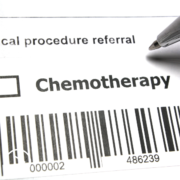The Truth About Managing Lung Cancer Treatment Side Effects
The Truth About Managing Lung Cancer Treatment Side Effects from Patient Empowerment Network on Vimeo.
Are lung cancer treatment side effects avoidable? Dr. Martin Edelman reviews effective management strategies. Want to learn more? Download the Program Resource Guide here.
Dr. Martin J. Edelman is Chair of the Department of Hematology/Oncology and Deputy Director for Clinical Research at Fox Chase Cancer Center. More about this expert here.
View more from Fact or Fiction? Lung Cancer
Related Programs:

Lung Cancer Treatment Decisions: Which Path is Best for You? |

|

|
Transcript:
Patricia:
Let’s talk a little bit about some of the concerns that patients have about the side effects. Let’s see: Side effects are unavoidable.
Dr. Edelman:
Well, that’s not true. As I said, what were the side effects? If you go back a couple decades and you ask patients what were they concerned about, many of them were concerned about nausea and vomiting. And that is largely a thing of the past. Many patients will still have some queasiness with treatment, but even our most nausea-producing drugs – we really do have outstanding drugs for the prevention of that. You have to use them. You have to take them.
It’s very important to give them appropriately. There are very excellent guidelines that are out there. Sometimes, patients are still undertreated, no question about that. Not every drug has industry strong backing. There’s one drug – for example, olanzapine, (Zyprexa) was actually developed as an antipsychotic, and I always tell the patients, “No, I don’t think you’re crazy.”
But it’s at a lower dose, and we have excellent, excellent evidence that that drug given for a few evenings after chemotherapy is extraordinarily effective along with the other drugs in preventing nausea and vomiting. So, that’s one thing.
Hair loss is still somewhat inevitable with certain drugs – the taxanes. But many of our regimens don’t cause hair loss.
Or as I tell folks – only you and your hairdresser will know for sure because its hair on the pillow, but the average person won’t pick you out of a crowd. Those are big concerns still. There still are potentially life-threatening effects from chemotherapy, and we spend a lot of time educating people about that. But those are not inevitable, and it’s actually a minority of patients in lung cancer.
One should not confuse – there are different malignancies. Still, the treatments for say leukemia, though even that’s changing, can be extraordinarily toxic or the bone marrow transplant patients. Many, not just lung cancer, but in the other diseases as well – many of the things that people attribute to the drugs are more due to the disease. So, I always say, “The greatest failure and side effects to the drugs are they don’t work well enough because the side effects of the disease can be considerable.” So, that’s the bigger issue. The immunotherapeutic drugs have a rather interesting set of side effects.
They are clearly initially or frequently better tolerated than the older cytotoxics, which still have an extremely valuable place in the treatment and cure of lung cancer. The immunotherapeutics have clearly been quite beneficial, but their side effects can be subtle and far less predictable and can be very severe. Virtually, any organ in the body can be affected by this. We like to say, “If it ends in ‘itis,’ you can get it from immunotherapeutics.”
So, there are lots of side effects, no question. But they can be managed. They can be prevented. They can be treated. Sometimes, we have to abandon a drug. So, people who get severe – what we call immunotherapy-related adverse events – may not be able to continue on their drugs. But even that is not necessarily always the case.
Patricia:
This next one really gets to the heart of the doctor-patient relationship. I shouldn’t share my side effects with my healthcare team because I don’t want them to stop my treatment routine.
Dr. Edelman:
Well, you can’t prevent the side effects if you don’t know about them. And I always would tell patients, I said, “You know, if you’re having a problem, please don’t call me at 4:00 on Friday afternoon. I’m gonna end up sending you to the emergency room, which I may anyway.” But a lot of times, we can solve certain things over the phone. There are a lot of side effects that can be treated and particularly if one is aware early on. So, yeah, you should share the side effects because how’s somebody gonna know how to deal with them?
Now, the problem we run into sometimes is in a population that’s on average 60s and 70s, could be younger. There’re lots of things that can be just part of ordinary life. Everybody gets headaches, back pain, etcetera, etcetera.
We have to treat those sometimes and evaluate them much more aggressively because of the possibility of them being related to disease or drug, but it helps to sort it out. You can’t be too blasé about it because sometimes things need to be looked at very urgently, particularly with immunotherapeutic drugs. Some of the side effects that can be severe can sometimes be very subtle in their onset.










